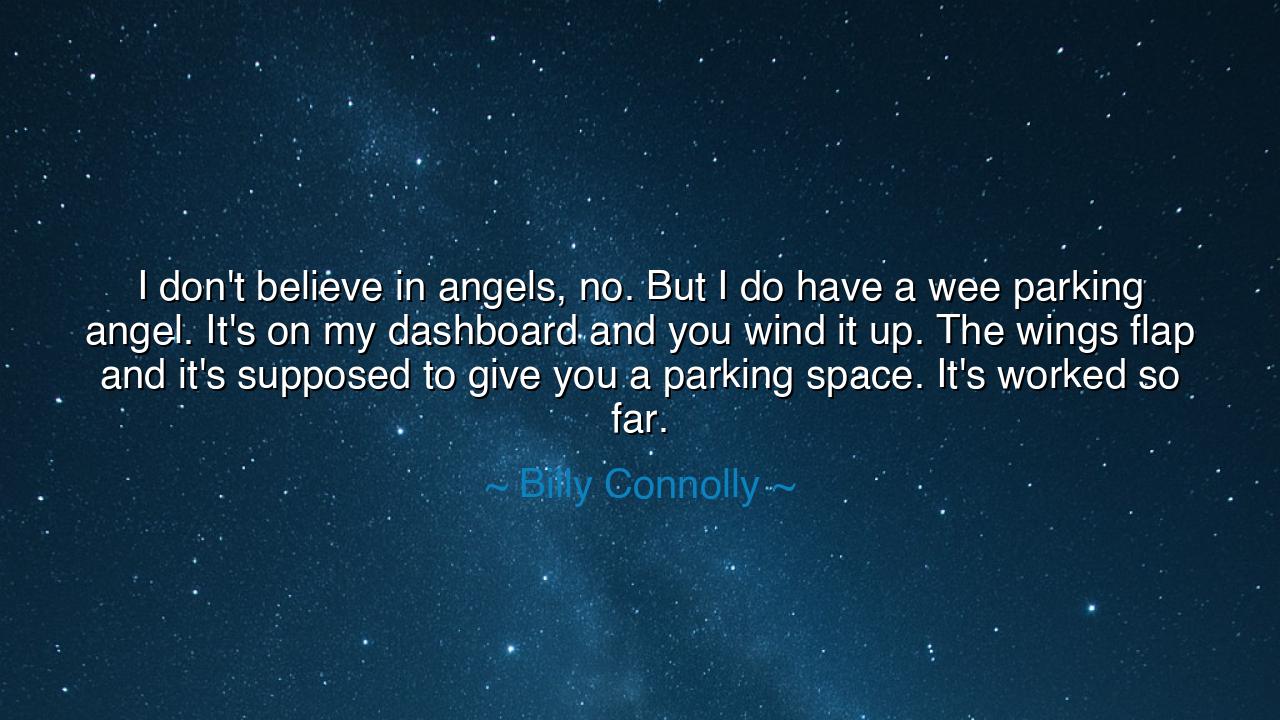
I don't believe in angels, no. But I do have a wee parking angel.
I don't believe in angels, no. But I do have a wee parking angel. It's on my dashboard and you wind it up. The wings flap and it's supposed to give you a parking space. It's worked so far.






The great humorist Billy Connolly once said, “I don't believe in angels, no. But I do have a wee parking angel. It's on my dashboard and you wind it up. The wings flap and it's supposed to give you a parking space. It's worked so far.” What seems at first a jest, a passing laugh about superstition and convenience, conceals a timeless truth about the nature of faith, humor, and the small rituals through which humans endure the uncertainties of life. Beneath Connolly’s laughter lies the ancient wisdom that belief does not always demand solemnity — that sometimes, the sacred hides in the playful, and even the mockery of faith can hold its own kind of reverence.
In the old days, when men bowed before stone idols or whispered prayers to unseen gods, they did so not merely out of fear but out of hope — the yearning to feel that the world had some kindness toward them. Connolly’s wee parking angel, a toy of tin and whimsy, stands as a modern echo of that longing. It is not divine; it is comic. Yet it plays the same role that talismans once did in the hands of pilgrims and travelers. The act of belief, however half in jest, brings peace to the restless spirit. Even when we laugh at our own superstition, the laughter itself becomes a prayer — a gesture toward trust in something beyond our control.
In this way, Connolly, the jester-philosopher, teaches us that irony and sincerity can dwell together. He says he does not believe in angels, yet he still winds up their wings. His disbelief does not rob him of wonder — rather, it refines it. The ancient Greeks might have called this “metis,” the clever wisdom of those who walk between seriousness and play. It is the wisdom of Odysseus, who faced gods and monsters yet never lost his humor; who knew that laughter is sometimes the truest form of courage. For to laugh, even while uncertain, is to affirm life’s beauty despite its absurdity.
There is a story of the painter Henri Matisse, who once said that when he could no longer walk, he began to paint angels on his ceiling — not because he believed they existed, but because he needed to believe in something light and beautiful when his body grew heavy. In his frailty, the idea of angels gave him wings of his own. Like Connolly’s parking angel, they were symbols — not of literal faith, but of the soul’s stubborn desire to find meaning, even in the mundane. So too, we find our own little angels — lucky charms, family sayings, daily habits — things that, though small, carry immense spiritual weight.
What Connolly’s words truly reveal is that belief does not need to be grand to be profound. It may dwell in a simple action — the winding of a toy, the pat on a dashboard, the whispered hope that a space will open up just when we need it. These acts of gentle superstition bind us to our humanity. They are the remnants of an older reverence, translated into humor for the modern age. For even when we mock faith, we often practice it unknowingly — in trust, in gratitude, in laughter.
Thus, the teaching is this: do not scorn the small rituals that bring you comfort. Whether they be prayers, charms, or little mechanical angels, they are vessels for the spirit’s yearning. The wise do not measure belief by its object, but by its effect — whether it brings peace to the heart, whether it opens a space for joy. If your wee angel helps you find calm amid chaos, then it has served its divine purpose, whether or not heaven itself ordained it.
So let us walk through life with the humility of those who both believe and laugh, who can pray with one hand and joke with the other. For humor, like faith, is a bridge between the human and the divine — the recognition that while we may not command the universe, we can still dance with it. As Connolly teaches, the heart that can laugh at its own beliefs is not faithless, but free. And perhaps that is the greatest miracle of all — that even a wind-up angel, with tin wings and no soul, can remind us of how deeply human it is to hope.






AAdministratorAdministrator
Welcome, honored guests. Please leave a comment, we will respond soon